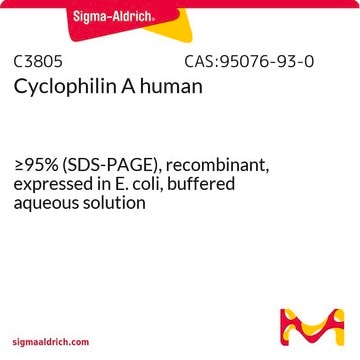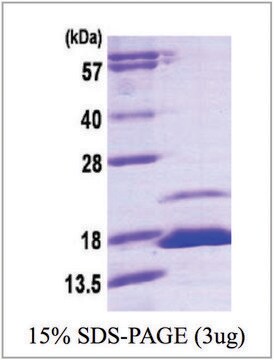SRP6091
FKBP1a/FKBP12 human
recombinant, expressed in E. coli, ≥95% (SDS-PAGE)
Sinónimos:
12 kDa FK506-binding protein, Calstabin-1, FK506 binding protein 1a, Immunophilin FKBP12, PPIase FKBP1A
About This Item
Productos recomendados
origen biológico
human
recombinante
expressed in E. coli
Análisis
≥95% (SDS-PAGE)
formulario
liquid
mol peso
14.1 kDa
envase
pkg of 100 μg
Nº de acceso NCBI
Nº de acceso UniProt
Condiciones de envío
dry ice
temp. de almacenamiento
−70°C
Información sobre el gen
human ... FKBP1A(2280)
Descripción general
Acciones bioquímicas o fisiológicas
Forma física
Nota de preparación
Otras notas
Código de clase de almacenamiento
11 - Combustible Solids
Clase de riesgo para el agua (WGK)
WGK 3
Punto de inflamabilidad (°F)
Not applicable
Punto de inflamabilidad (°C)
Not applicable
Certificados de análisis (COA)
Busque Certificados de análisis (COA) introduciendo el número de lote del producto. Los números de lote se encuentran en la etiqueta del producto después de las palabras «Lot» o «Batch»
¿Ya tiene este producto?
Encuentre la documentación para los productos que ha comprado recientemente en la Biblioteca de documentos.
Nuestro equipo de científicos tiene experiencia en todas las áreas de investigación: Ciencias de la vida, Ciencia de los materiales, Síntesis química, Cromatografía, Analítica y muchas otras.
Póngase en contacto con el Servicio técnico








